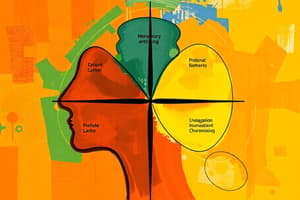Podcast
Questions and Answers
Which statement best describes the concept of self-concept?
Which statement best describes the concept of self-concept?
- Self-concept is related only to one's abilities and not to relationships.
- Self-concept is solely determined by cultural factors.
- Self-concept is a dynamic mental picture of one's personality and values. (correct)
- Self-concept is static and does not change over time.
Which philosopher claimed that the self is a product of brain activity?
Which philosopher claimed that the self is a product of brain activity?
- Paul Churchland (correct)
- Friedrich Nietzsche
- Immanuel Kant
- William James
What is the primary focus of neurophilosophy as defined by Patricia Churchland?
What is the primary focus of neurophilosophy as defined by Patricia Churchland?
- The use of metaphysical principles to explain cognitive phenomena.
- The application of neurological findings to traditional philosophical problems. (correct)
- The exploration of philosophical arguments without considering the brain.
- The study of consciousness without linking it to brain activity.
According to the Five-Factor Model, which trait is associated with a person's emotional stability?
According to the Five-Factor Model, which trait is associated with a person's emotional stability?
What does the trait of agreeableness indicate in the Five-Factor Model?
What does the trait of agreeableness indicate in the Five-Factor Model?
What is a significant role that culture plays in shaping an individual's personality?
What is a significant role that culture plays in shaping an individual's personality?
How does self-understanding differ from self-concept?
How does self-understanding differ from self-concept?
Which trait in the Five-Factor Model indicates a person’s level of organization and responsibility?
Which trait in the Five-Factor Model indicates a person’s level of organization and responsibility?
Which characteristic of the self indicates that it exists independently and possesses its own thoughts?
Which characteristic of the self indicates that it exists independently and possesses its own thoughts?
What does the etymology of the word 'personality' suggest about its origins?
What does the etymology of the word 'personality' suggest about its origins?
Which of the following factors does NOT influence personality?
Which of the following factors does NOT influence personality?
The Japanese proverb about three faces illustrates what concept about personality?
The Japanese proverb about three faces illustrates what concept about personality?
Which mental health condition is characterized by extreme mood swings?
Which mental health condition is characterized by extreme mood swings?
Which of the following describes the 'unitary' quality of self?
Which of the following describes the 'unitary' quality of self?
Which of the following biological factors is known to influence personality?
Which of the following biological factors is known to influence personality?
What aspect of the brain is being researched to understand personality differences?
What aspect of the brain is being researched to understand personality differences?
Flashcards are hidden until you start studying
Study Notes
Situational Factors
- Situational factors temporarily alter behavior; actions may differ between formal and casual settings.
Cultural Factors
- Culture significantly shapes personality, affecting learning, values, and interactions with the world.
Personality Traits
- Personality traits are persistent patterns of thoughts, feelings, and behaviors.
- Five-Factor Model identifies five core traits:
- Openness: Willingness to embrace new experiences and ideas.
- Conscientiousness: Level of organization, responsibility, and self-discipline.
- Extraversion: Degree of sociability, assertiveness, and energy.
- Agreeableness: Tendency toward empathy, cooperativeness, and social harmony.
- Neuroticism: Likelihood of experiencing negative emotions such as anxiety and sadness.
Self-Concept
- Self-concept is the mental image one has of oneself, including personality, abilities, and values.
- Self-understanding encompasses awareness of one's motivations and actions.
- Self-concept evolves over time, becoming more detailed and organized with age.
- Influenced by relationships, social groups, and life experiences.
Immanuel Kant
- A German philosopher noted for contributions to metaphysics, epistemology, and ethics.
- Argued that the self is a product of reason, which unifies experience.
Paul and Patricia Churchland
- American philosophers focused on philosophy of mind, cognitive neurobiology, and epistemology.
- Assert that traditional concepts of the self misrepresent realities, viewing the self as a product of brain activity.
- Patricia Churchland introduced "neurophilosophy," merging neurology with philosophical inquiries.
Characteristics of Self
- Separate: Each self is distinct and possesses its own identity.
- Self-contained and Independent: Capable of existing with unique thoughts and volition.
- Consistency: Reflects stable tendencies, traits, and potentials.
- Unitary: Serves as the central point of experiences and thoughts.
- Private: Individuals manage their thoughts and feelings internally.
Etymology and Definition of Personality
- "Personality" derives from the Latin "persona," referring to theatrical masks in drama.
- Generally understood as a combination of permanent traits and unique characteristics that shape consistent behavior.
- Japanese proverb highlights that individuals present different sides of themselves to various groups.
Determinants of Personality
- Determined by environmental and biological factors.
Environmental Factors
- Encompass surroundings including neighborhood, school, and workplace.
Biological Factors
- Heredity: Genetic traits inherited from parents influence physical appearance and behavior.
- Physical Features: Characteristics such as height, weight, sex, and body language affect personality.
- Brain Activity: Insights into personality arise from studying brain electrical activity, as seen in various mental health conditions.
Mental Health Conditions
- ADHD: Characterized by attention and hyperactivity challenges.
- PTSD: Arises after traumatic experiences, affecting emotions and behavior.
- Bipolar Disorder: Involves extreme mood fluctuations.
- Depression: Persistent feelings of sadness and loss of interest in daily activities.
Studying That Suits You
Use AI to generate personalized quizzes and flashcards to suit your learning preferences.




